

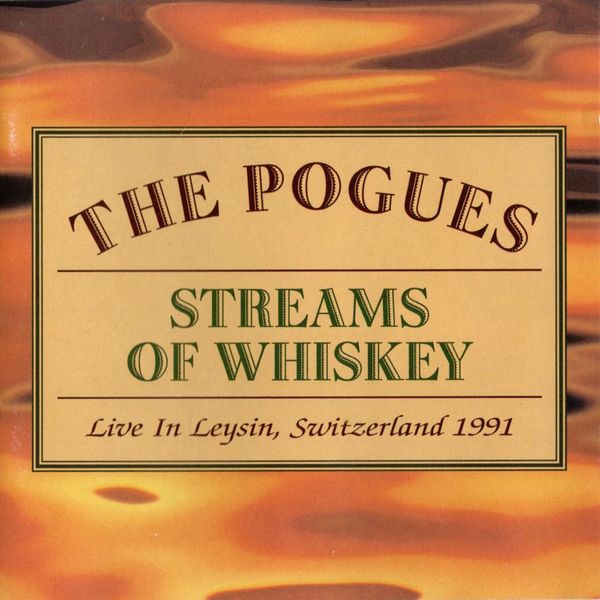
|
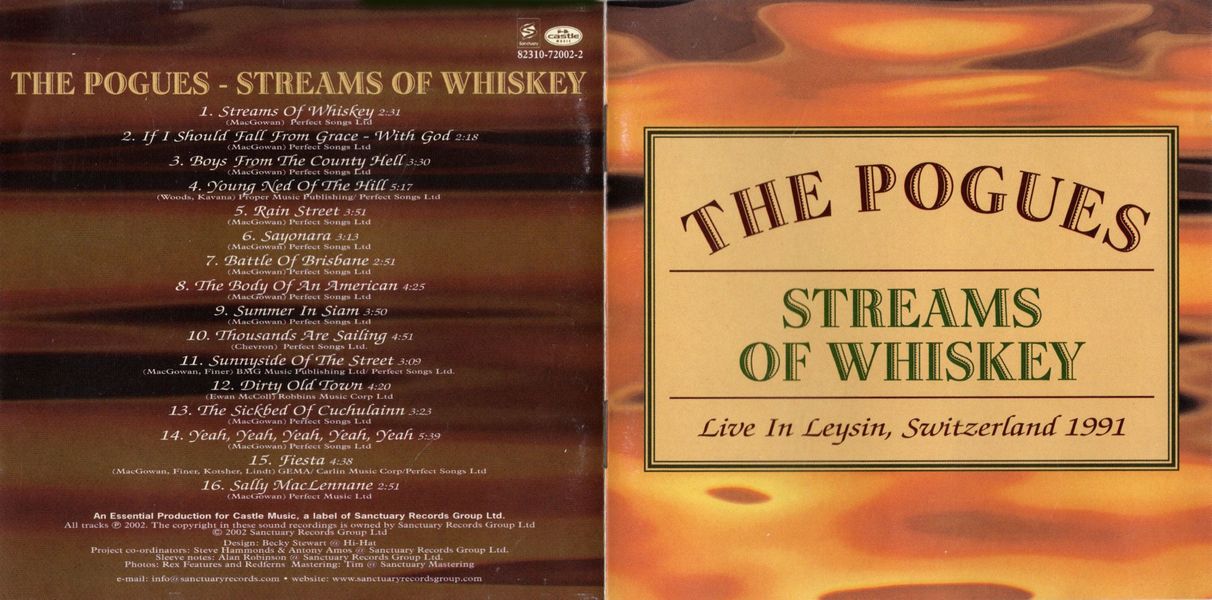
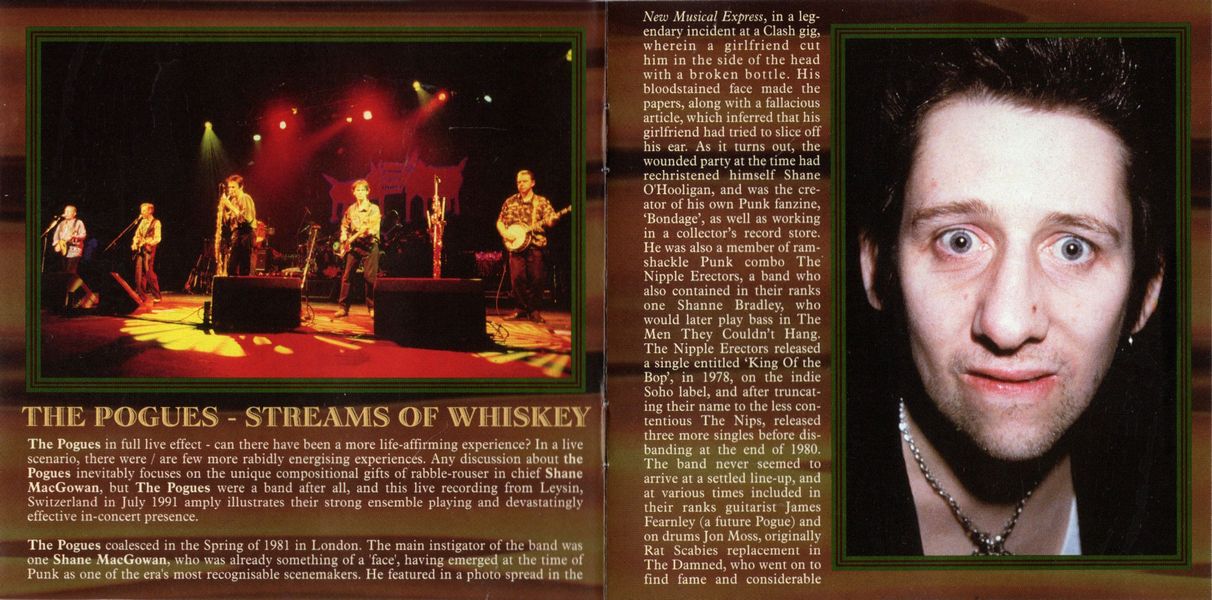
|
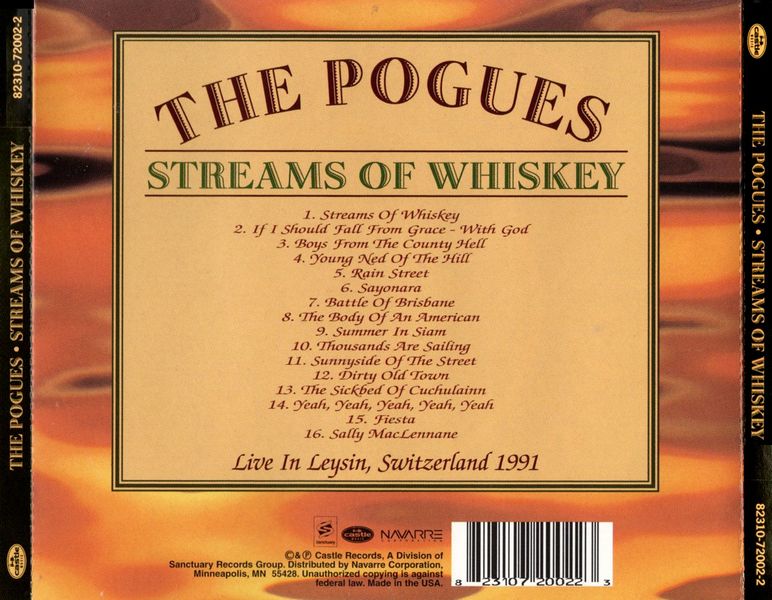
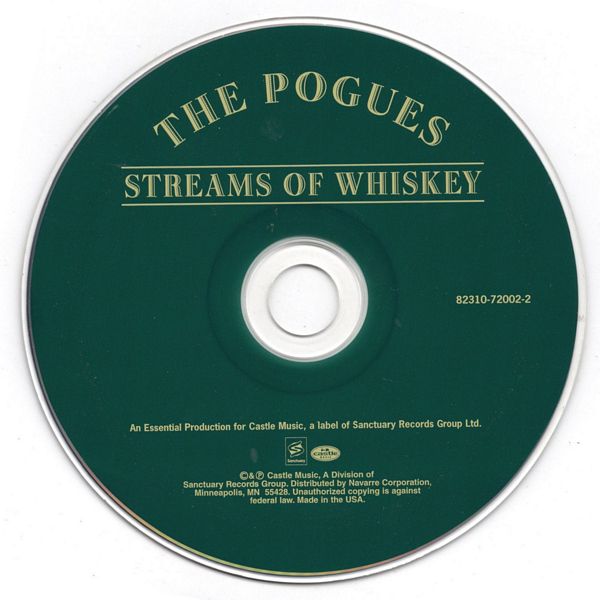 |
| more images |
Sleeve Notes
The Pogues in full live effect — can there have been a more life-affirming experience? In a live scenario, there were / are few more rabidly energising experiences. Any discussion about the Pogues inevitably focuses on the unique compositional gifts of rabble-rouser in chief Shane MacGowan, but The Pogues were a band after all, and this live recording from Leysin, Switzerland in July 1991 amply illustrates their strong ensemble playing and devastatingly effective in-concert presence.
The Pogues coalesced in the Spring of 1981 in London. The main instigator of the band was one Shane MacGowan, who was already something of a 'face', having emerged at the time of Punk as one of the era's most recognisable scenemakers. He featured in a photo spread in the New Musical Express, in a legendary incident at a Clash gig, wherein a girlfriend cut him in the side of the head with a broken bottle. His bloodstained face made the papers, along with a fallacious article, which inferred that his girlfriend had tried to slice off his ear. As it turns out, the wounded party at the time had rechristened himself Shane O'Hooligan, and was the creator of his own Punk fanzine, 'Bondage', as well as working in a collector's record store. He was also a member of ramshackle Punk combo The Nipple Erectors, a band who also contained in their ranks one Shanne Bradley, who would later play bass in The Men They Couldn't Hang. The Nipple Erectors released a single entitled 'King Of the Bop', in 1978, on the indie Soho label, and after truncating their name to the less contentious The Nips, released three more singles before disbanding at the end of 1980. The band never seemed to arrive at a settled line-up, and at various times included in their ranks guitarist James Fearnley (a future Pogue) and on drums Jon Moss, originally Rat Scabies replacement in The Damned, who went on to find fame and considerable fortune as drummer in 80's hitmakers Culture Club. The Nips had managed to build up a bit of a following, playing support slots with the likes of The Jam and The Clash, and indeed Jam main man Paul Weller thought highly enough of them to produce the single 'Happy Song'.
Just to confuse matters a little, Shane played in another Punk combo, The Millwall Chainsaws around this time. Also in the line-up was one Peter Spider' Stacy on vocals, who would loom large in The Pogues story in the fullness of time. Not content with this, Shane also played bass in a backing band for a schoolteacher, alongside his friend Jeremy 'Jem' Finer. In terms of the soon-to-be Pogues history, it's The Millwall Chainsaws that provide the blueprint for how the band would eventually shape up.
As time moved on, The Millwall Chainsaws morphed into The New Republicans, taking their inspiration from veteran Irish carousers The Dubliners with a hefty dose of The Clancy Brothers thrown in for added mayhem. The band played a raucous set that was abruptly curtailed when the audience pelted them with chips for what was perceived as a pro (Irish) Republican political stance. The Millwall Chainsaws would turn out to be the true genesis of Pogue Mahone (Gaelic for 'kiss my hole', apparently), who would ultimately become simply The Pogues. After initially auditioning neighbour Andrew Ranken on drums (he turned them down at first), and recruiting former Nips guitarist James Fearnley as an accordion player, and adding drummer John Hasler, a basic line-up was convened. In the days prior to the band's first gig, Shane asked Spider to come along for the show, and Pogue Mahone were born, after considering such nomenclature as The Men They Couldn't Hang and Noisy Boysies, it was Spider who came up with the pithy epithet that would be the band's name. The band played their first show at The Pindar Of Wakefield pub on the 4th October 1982. The very next day, Shane found a bass player in the shape of a former customer from his record shop days, Cait O'Riordan (she'd bought a Nips single, apparently). In March 1983, Andrew Ranken was finally added to the Pogue Mahone personnel, and a settled line-up was formed.
Spider almost didn't survive the band's first gig; the rest of the band wanted to get rid of him (he was alternating vocal duties with Shane), but MacGowan persuaded him to stay on condition that he learnt the penny whistle and got himself a suit.
The band started to build up something of a following, Shane was already a known 'face', as I said, and the pungent Pogue Mahone mixture of Irish drinking songs, Shane's own observations on big city flotsam and jetsam, and the audience's pursuit of booze-fuelled good times was a welcome antidote to synth-pop and Duran Duran that then held sway. MacGowan wanted to engender the spirit and energy of the Irish Ceildi with a flavour and excitement that he'd found in Punk Rock, and it worked.
After truncating their name to The Pogues, the band scored a deal with Stiff Records, then the home of such diverse talents as Madness and The Belle Stars. The debut album, 'Red Roses For Me' was released in October 1984. It was pretty much a representation of what the band were like live, but was perhaps most notable for the emergence of Shane MacGowan as a perceptive and gifted songwriter, with songs such as 'Streams Of Whiskey' and 'Dark Streets Of London' charting a kind of latter-day Rake's Progress through the seamier side of metropolitan life.
As time moved on, The Pogues became seen as among the leaders of a bunch of similarly-inclined London based combos such as The Men They Couldn't Hang and The Boot Hill Foot-Tappers, who were likewise revisiting a rootsy sound whilst updating it for the mid-1980s. There wasn't a 'scene' as such, but the Press nonetheless enjoyed concocting a kind of 'Cow Punk', as it were, by which to yoke the main protagonists.
The second Pogues album, 'Rum Sodomy, & The Lash', produced by former Stiff signee Elvis Costello, considerably consolidated the band's fan following, and added further lustre to MacGowan's burgeoning songwriting reputation. Superb songs such as 'A Pair Of Brown Eyes' and 'The Old Main Drag' took the Irish traditional song into refreshingly contemporary waters, and the band's readings of such hoary chestnuts as 'Dirty Old Town' a reclaimed Folk song from dusty back rooms of pubs and Arran sweatered Real Ale enthusiasts and put it into the here and now.
One casualty of the second album would ultimately be Cait O'Riordan, who had formed a relationship with producer Elvis Costello, eventually becoming his wife. Her replacement was band tour manager Darryl Hunt.
The band reached arguably a peak with the brilliant 'If I Should Fall From Grace With God', released in March 1988. By this time, their ranks had been swelled by the addition of guitarist Phil Chevron, who had been with Irish Punk combo The Radiators From Space, and Terry Woods. Woods was something of a veteran of the British Folk scene, having been in a duo with wife Gay, his own The Woods Band and Steeleye Span. One-time Steeleye sound engineer Frank Murray was The Pogues manager. Woods' addition was seen by some as adding some rootsy musical credibility to The Pogues sound; an unfair criticism of the band's pre-Woods line up, perhaps, but Woods undoubtedly leant the band a greater range and instrumental diversity to back up MacGowan's growing compositional excellence. A triumphant week of shows at London's Town & Country Club in March '88 was capped with a sell-out show at the huge Brixton Academy, and the band appeared to be on the way to great things, especially after enjoying a hit single with the delightful 'Fairytale of New York', in which Shane duetted with the late Kirsty MacColl.
MacGowan made two more albums with The Pogues — 'Peace And Love' (1989), and 'Hell's Ditch' (1990). The band were promoting their Best Of album when they played this raucous set in Switzerland in 1991, and what you get is pretty much a Pogues live 'Greatest Hits' — carousing belters such as 'If I Should Fall From Grace With God' and 'Sally MacLennane' cutting their recorded originals with a dash and elan as only a truly great live band can.
MacGowan's increasing unreliability and wayward behaviour contributed to his departure from the band later in the year, but it ain't over till it's over; at the time of writing, The Pogues are about to undertake a reformed tour of the UK and Ireland in December 2001. If they're in as good form as this live souvenir, then thousands will go home happy.
Alan Robinson
Notes
The following is posted on the band's website:
"This album has been released without the permission, and contrary to the wishes of the band. It is a not great quality recording from a Swiss festival (July 12, 1991), recorded from a radio broadcast and previously available as a bootleg. The deputy drummer is Danny Heatley, who later played with
The Popes."